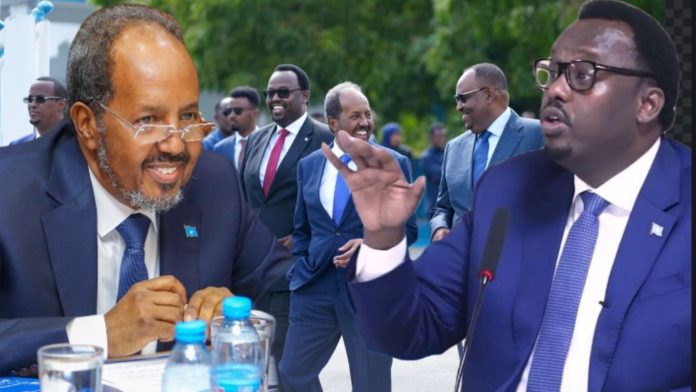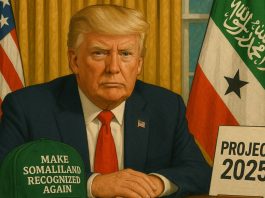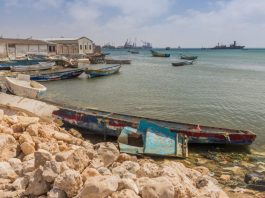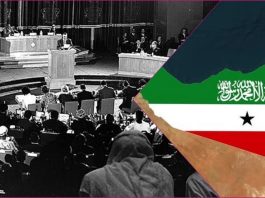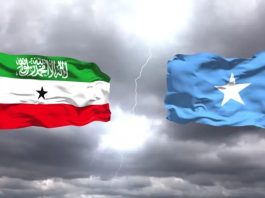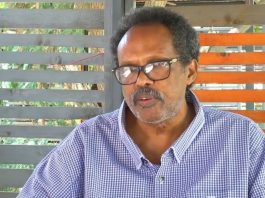Over the weekend, a dormant campaign promise was revived. In 2022, Villa Somalia’s President, Hassan Sheikh Mohamud (HSM), proposed that a second Deputy Prime Minister position be established for the Rahanweyn clan, which largely occupies Southwest State.
While it has been couched as a rebalancing of the ‘4.5 system’ and enjoys the support of several South West State parliamentarians, it has been perceived as another attempt to shore up Villa Somalia’s dwindling political support. The revival has certainly not been received well in all quarters, with the incumbent Deputy Prime Minister Salah Jama mobilizing his parliamentary allies against the plan.
The timing is conspicuous– coming shortly after the reopening of the federal parliament and ahead of the expected tabling of Chapters 5–9 of the Provisional Constitution. In mid-May, the Independent Constitutional Review and Implementation Commission (ICRIC) convened in Mogadishu to begin the official drafting process of these chapters, which cover important subjects, including critical aspects of federal-regional relations and where executive power lies within Somalia’s federal system.
While we will have to wait and see what amendments have been made, it is highly likely to follow a similar pattern to the revisions of Chapters 1–4—centralizing power in the presidency and the federal government overall. Of particular note will be whether Villa Somalia seeks to amend Article 97 to invest executive powers in the presidency instead of the Council of Ministers chaired by the Prime Minister. It would be particularly ironic that HSM appoints a new second Deputy Prime Minister in order to pass legislation that essentially disempowers the Council of Ministers overall and the Prime Minister’s Office in particular. A truly self-defeating exercise.
Earlier this year, the amended Chapters 1-4 speedily passed through parliament ‘unanimously’ following immense arm-twisting, disregard for constitutional and parliamentary procedure, and the lining of lawmakers’ pockets, but it was a rather bruising battle for Hassan Sheikh’s administration. Their passage triggered the withdrawal of Puntland’s official recognition of the federal government. In the meantime, with most lawmakers having returned to Mogadishu, though they may not bother to turn up to parliament, political jockeying is back in full swing.
Proposing to elevate Rahanweyn’s representation in the federal government is not the only political game afoot. In recent weeks, South West State President Abdiaziz Laftagareen and federal government relations have taken a dive due to divergences over the presence of Ethiopian troops in Somalia, as well as regional presidential elections. By offering the Rahanweyn another senior post, HSM seeks to keep federal lawmakers representing South West State from supporting their regional president.
Simultaneously, Laftagareen has been quietly supporting incessant calls by opposition parliamentarians for Prime Minister Hamza Abdi Barre and HSM to be impeached or resign. And the regional president reportedly intends to remain on the sidelines of upcoming constitutional debates, despite agreeing to back them in May at the National Consultative Council (NCC) meeting in Mogadishu.
In Somalia’s clan-based political system, the position of Deputy Prime Minister has been ostensibly held for the Dir/Mirifle clan but has typically been occupied by an Isaaq politician– including the incumbent Jama. While Jama and his fellow– largely Isaaq– allies in parliament may angrily protest Villa Somalia’s latest gambit, there is little they can do to prevent it. These are token politicians who are largely despised in the polity they claim to represent, with no influence over the daily workings of Somaliland.
 Much like the Chinese representatives who assert sovereignty over Taiwan, these Dir/Mirifle lawmakers could not travel to Hargeisa if they wanted to. Even within Somalia’s parliament, the minimal ‘Somaliland’ faction is unaligned with any significant voting bloc, such as the Darood-based Puntland or Jubaland coalition.
Much like the Chinese representatives who assert sovereignty over Taiwan, these Dir/Mirifle lawmakers could not travel to Hargeisa if they wanted to. Even within Somalia’s parliament, the minimal ‘Somaliland’ faction is unaligned with any significant voting bloc, such as the Darood-based Puntland or Jubaland coalition.
If HSM follows through on establishing a second Deputy Prime Minister position—and there is every chance he will withdraw from this idea once Chapters 5–9 are passed—some ‘Somaliland’ parliamentarians may resign from their posts. As is always the case with blood in the proverbial political water, the usual troublemakers have resurfaced, including former PM Hassan Ali Khaire, who has asserted that the Isaaq should have greater representation in Somalia. The Dir/Mirifle currently hold the positions of Upper House Speaker and Second Deputy of the Lower House.
More importantly, this is the latest example of the conscious shrinking of political space for the Dir/Mirifle in Somalia. The Rahanweyn may make a compelling argument that they are under-represented within the 4.5—currently holding just the Speaker of the Lower House and the South West State presidency– rebalancing should not come at the expense of the Dir/Mirifle.
In contrast, the Hawiye hold the federal presidency, the Deputy Speaker of the Upper House, and the regional presidencies in both Galmudug and Hirshabelle, while the Darood hold the position of Prime Minister and leadership in Jubaland and Puntland. Rather than squabbling over whether another Deputy Prime Minister position will be created, Rahanweyn and Dir/Mirifle parliamentarians would do better to effectively scrutinize Chapters 5–9 and hold the federal government to account — as if their legislative and constitutional duty.
This is also an odd move by Mogadishu, considering that Somalia is supposed to be transitioning to a one-person, one-vote (OPOV) system within two years under the current administration. Introducing another senior federal government post based on clan contradicts Villa Somalia’s repeated heralding of imminent direct democracy.
Moreover, considering the placement of Hawiye into dozens of senior federal positions, we should certainly not regard this plan as an altruistic attempt to rebalance the system in favor of the Rahanweyn. We have seen this type of move play out time and again, both in crises facing the federal government and in its proposed solutions. Continual short-term, self-interested political reform is no way forward — particularly if the position of Deputy Prime Minister is essentially rendered null and void in the next tranche of constitutional amendments.
Instead, HSM and his government should renew their commitment to Somalia’s federal system. This means far more than engaging in back-room deals with Laftagareen and other Federal Member State leaders to ensure their support, it means constructively engaging with clans and communities across the country — including the Rahanweyn and the Isaaq.

